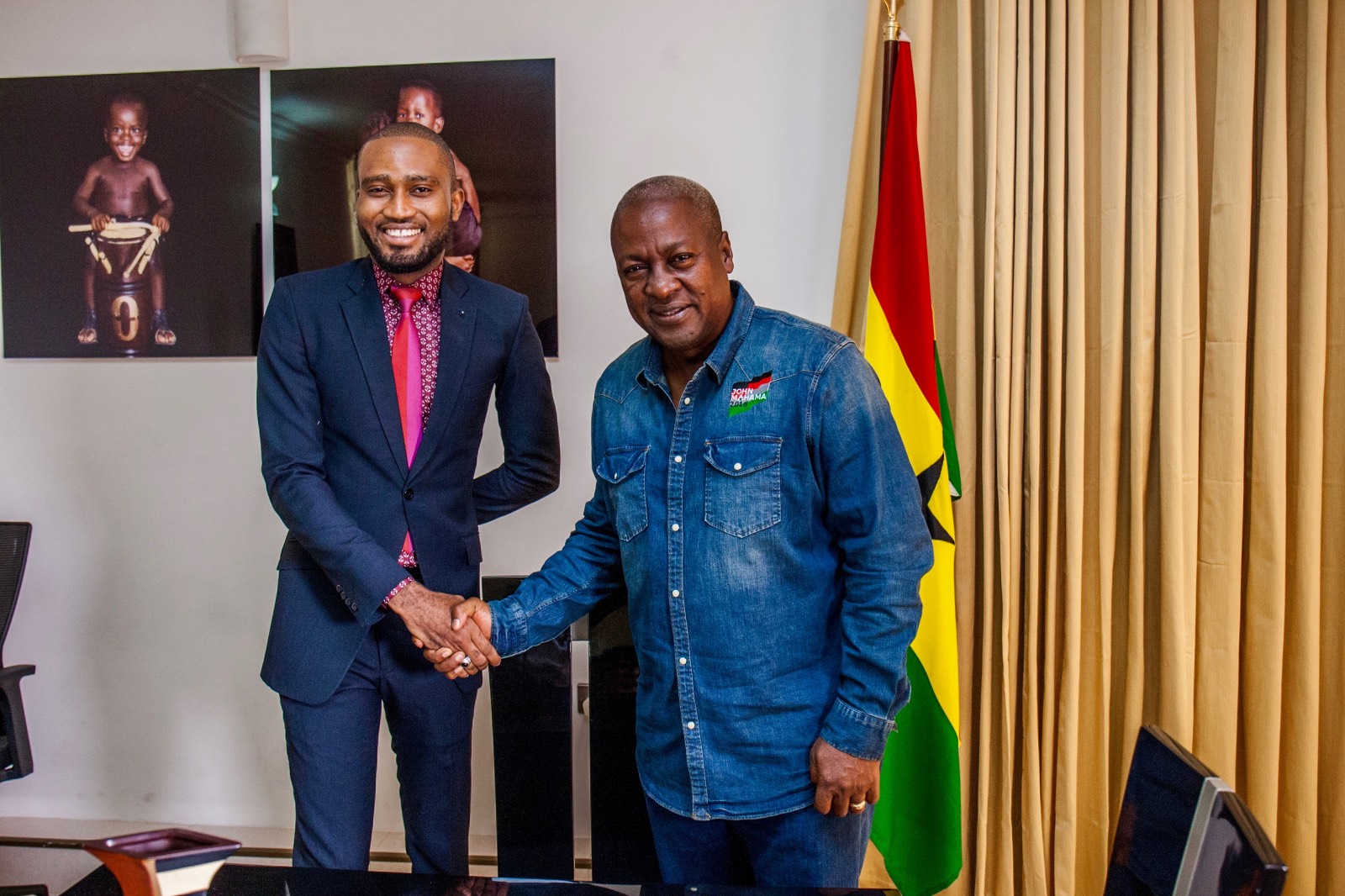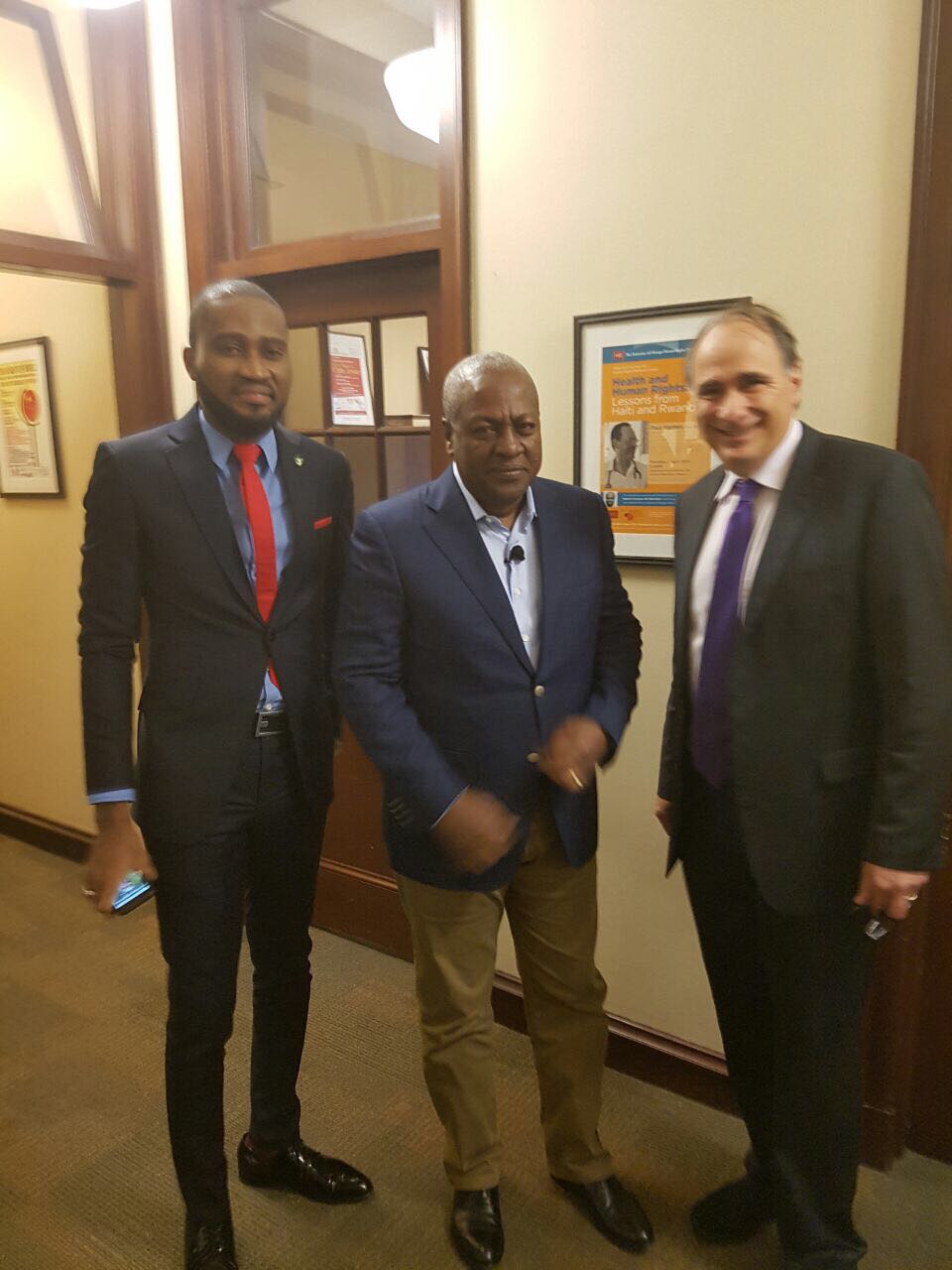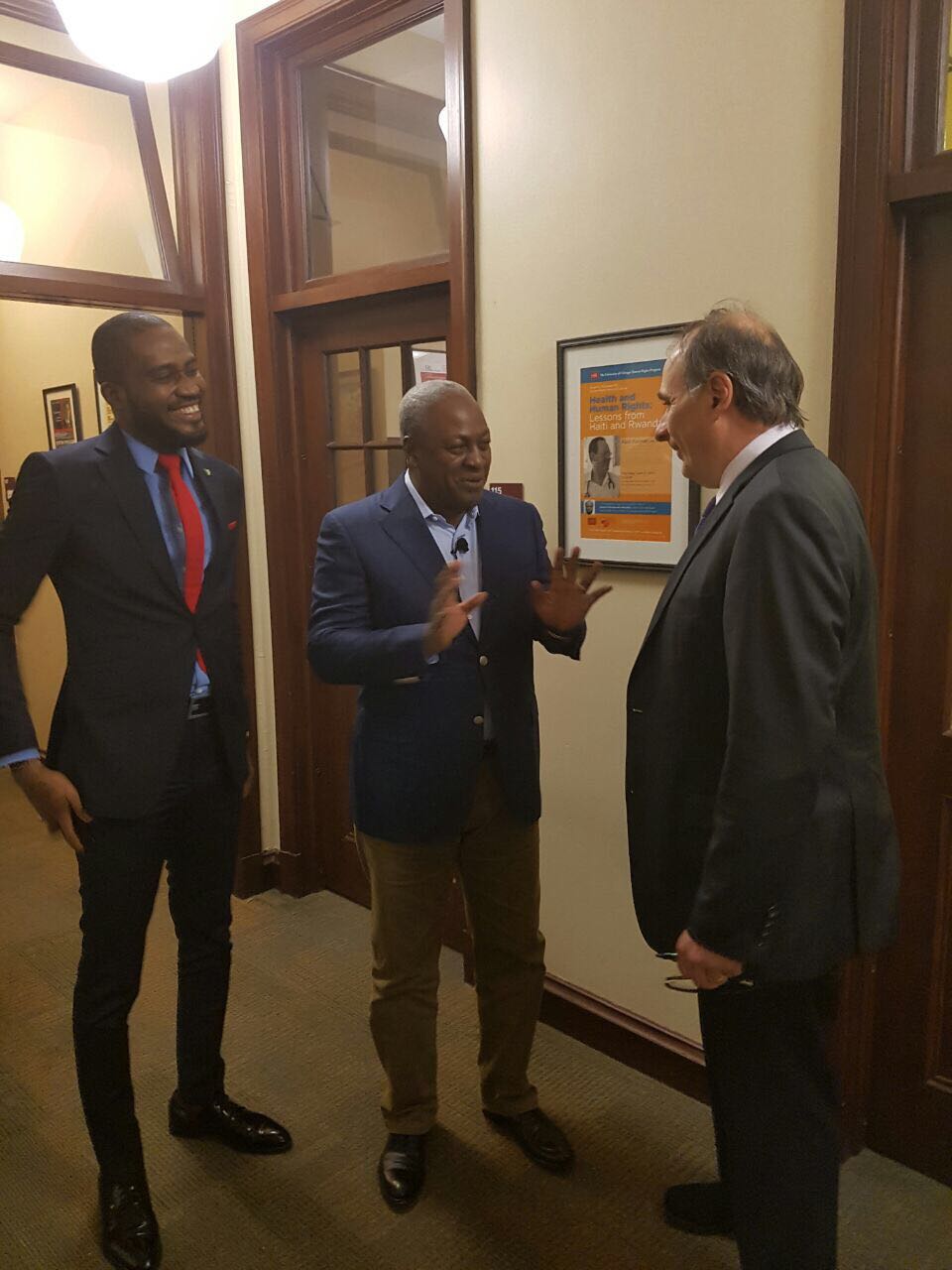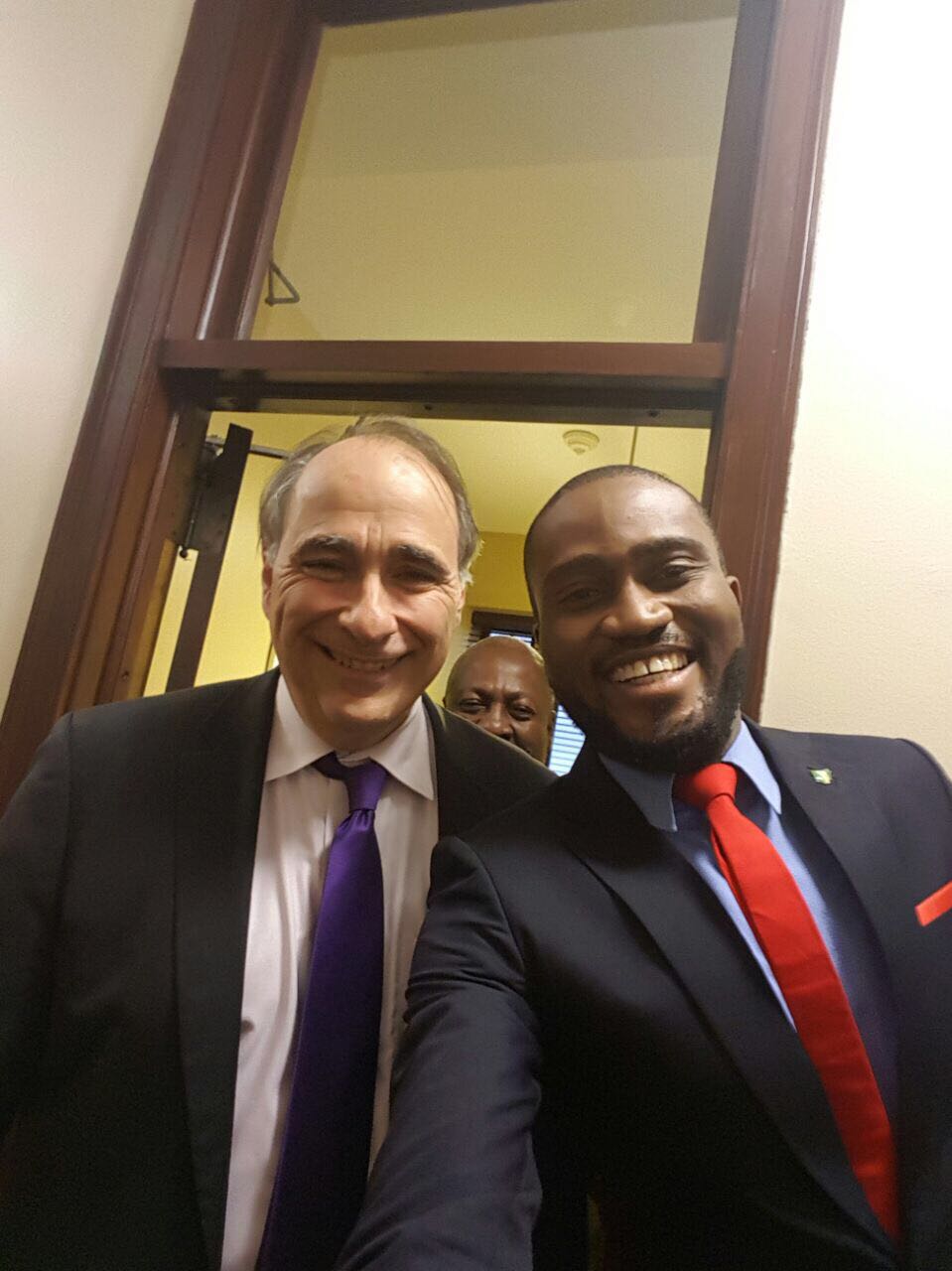Popularly known as Mr. Fix Nigeria, Ohimai Godwin Amaize is a Nigerian media personality, political strategist and publisher. He served in the Nigerian government from 2011-2015 as a ministerial aide at Nigeria’s ministries of youth development, sports, defence and foreign affairs. He worked as a new media strategist on the re-election campaign of Ghana’s former President John Mahama. In this exclusive interview with, Ephraim Adiele, The Trent’s Associate Editor, he bares his mind on the Ghana presidential elections, Nigerian youths in politics and governance amongst other issues.
You are currently on a tour of the University of Boston, the Massachusetts Institute of Technology, MIT, and Harvard University on the entourage of Ghana’s former President, John Dramani Mahama. What can you tell us about these engagements?
Well, our work as journalists is to cover important and newsworthy events happening across the globe. Also, if you followed closely the 2016 presidential elections in Ghana, you would have noticed my involvement as Coordinator of the Ghana At Work project which was essentially devoted to archiving and showcasing the developmental achievements of President John Mahama while he was in office. He did not win his re-election campaign for a second term but a lot of the work he did as President of Ghana has become a model to many developing countries across the world especially in Africa. He has attracted so much international goodwill since he left office and he is increasingly one of the world’s most sought after speakers on good governance today with diverse speaking engagements across the globe, the most recent being the ones at Harvard, Boston University and the Chicago Council Global Food Security Symposium in Washington DC.
You have been described as the first Nigerian youth to be a foreign President’s New Media Consultant through your Ghana at Work project. This came five years after you set a record as the world’s youngest presidential campaign manager ever during the 2011 presidential elections in Nigeria. How was this experience in Ghana?
It was an interesting experience. Of course, political campaigns are not entirely new to me and just as you recalled, in 2011, I was a presidential campaign manager in Nigeria at the age of 26. But working in Ghana unpacked new experiences. I had practically relocated from Nigeria, left my family in Abuja and was in Ghana for six months working on diverse components of the campaign. We developed a series of new media campaigns, we shot videos, we visited project sites and organized events showcasing the development strides of President Mahama and we travelled to all the 10 regions of Ghana. All of them! Sometimes, we travelled on the President’s campaign trail but for the most part, my project team and I were travelling on our own. My time in Ghana revealed a lot about the similarities and divergences between Ghana and Nigeria. Despite some of the opposition and hostility we encountered, I can say that Ghanaians are a largely peaceful people and the tension and violence you witness during Nigerian elections was absent during the Ghanaian elections. But one thing we share in common is the creative spirit of young people. And I think it’s an African thing. Young Africans, everywhere you find them are at the forefront of innovation, creativity and enterprise.
Ohimai Amaize, @MrFixNigeria is the 1st Nigerian youth to be a foreign President’s New Media Consultant (Mahama). He also worked for Nigeria
— Africa Facts Zone (@AfricaFactsZone) March 14, 2017
What would you say was responsible for the outcome of the elections as President Mahama was not re-elected despite the huge infrastructural development he had embarked on?
Like I always tell people, for every election, there are usually so many factors and dynamics at play. If you take a critical look at most candidates who won or lost elections, no single factor can be said to have been responsible for either outcome. And that is why I think it is the height of immodesty for anyone to claim they made anyone President, because when you look at a presidential campaign, there are different layers of work going on; there are the volunteers who spend sleepless nights working on the trenches, you have the party officials who are engaged in grassroots mobilization, you have the social media team, you have those who are busy with fund raising, you have the pollsters, you have the back-room strategists, you have the image handlers and a lot more like that. So you don’t just wake up one day because you organized a photo shoot for a candidate or designed a couple of fliers and then claim you made the winner president. It’s fraudulent for one individual to claim credit for the election of any president or any elected official for that matter, because when you do that, you are undermining the efforts and usurping the contributions of millions of other people who collectively made the success possible. It is the same way if you are looking at the loss, you have to do a holistic analysis of what went wrong. In Ghana, I think it was meant to happen that way. It wasn’t because President Mahama was not a good candidate. People just wanted to see a new leadership even if they had no idea what change would eventually mean for them and you see this trend being replicated across Africa and beyond. So I’ve learnt from experience that sometimes, elections are not won based on the best strategy or who has the best ideas and programmes. If you look at the United States presidential elections, the eggheads and media analysts had given the election to Clinton but the outcome sent shock waves across the world. Increasingly, it has become clear that elections are not won by sound logic. There are emotive, political, economical, primordial and diverse other factors that account for the outcomes.
Click on any image to enlarge
You’ve been a major advocate for youth in politics. Are Nigerian youths ready to lead?
I’ve advocated for youth participation and youth inclusion in politics and governance to the extent to which they are youths who have the character, the competence and the pedigree. I’m not just an advocate for youth’s sake because just as you have corrupt and incompetent leaders in the older generation, you also have them among our generation of youths. Youth should not an express ticket to leadership. It has to be more than that. If you look around today, you will see the craftiness, vain competition, fraud and deceit that we condemn so much in the older generation manifesting itself in our generation of youths. An international journalist I met in Harvard could not conceal shock and disbelief when I was introduced as ‘Mr Fix Nigeria’ because according to him, someone else has been going about in international circles parading himself as Mr Fix Nigeria. When he looked up my profile on the Internet, he was even more astonished and was forced to ask; “Why are you allowing people to distort facts about what’s going on in the youth space in Nigeria?” My response to the journalist was simple. I told him I wasn’t sure it’s my job to go about fact-checking claims by impostors. If someone tells you they invented the moon, you should ask for evidence and until you get that evidence, you shouldn’t rush to publish anything even if they are your friends. And I said to him, look, you have allowed a few people to manipulate you because when you guys come to Nigeria, you come with the impression that everything about Nigeria begins and ends in Lagos.
There are hundreds of thousands of young Nigerians from Calabar to Sokoto and from Ibadan to Enugu who are doing a lot of incredible work quietly but you chose to situate your narrative about Nigeria on Lagos. You can’t do that and have a fair assessment of Nigerian youths. But sadly, this is the reality of the Nigerian youth space today where defrauding others and distorting facts in the name of “packaging yourself” appears to be the fastest route to climbing up the social ladder. So tell me, today we are complaining about the do-or-die politics of the older generation, but what we are doing to ourselves as young people is much worse. And it only gives you a premonition of what some of our youths will become in the near future.
Going back to your follow-up question, are the youths ready to lead? I think the real question should be; are the youths ready to be mentored for leadership? I have no issues with young people aspiring to be great or working hard to break new boundaries while setting new records. But young people must learn to serve in the place of humility, patience and hard-work before aspiring for leadership. Young people must understand that there are no short-cuts to greatness and if in the classroom of life, you skip classes, it will come back to bite you some day. Much of what we call success today are people skipping classes only to fizzle out with time. We cannot sustain real advocacy for youth inclusion in governance on these fragile principles. That’s why it’s increasingly more difficult for the older generation of our leaders to take our young people seriously. The reality today is that most politicians find the youths useful during the elections, only to discard them after gaining power and then these youths are forced to find another paymaster to support against the one they backed in the previous election. Why are we allowing Nigerian youths to be profiled as hustlers?
Are you running for political office anytime soon?
Well, all I would say is that my steps are ordered by God and with each passing day He unveils new directions. I don’t know if I will ever run for public office but I think that ultimately rests in God’s hands.
Thank you for your time.
It’s been my absolute pleasure.










